词形转换
(完整)词形转换-名词
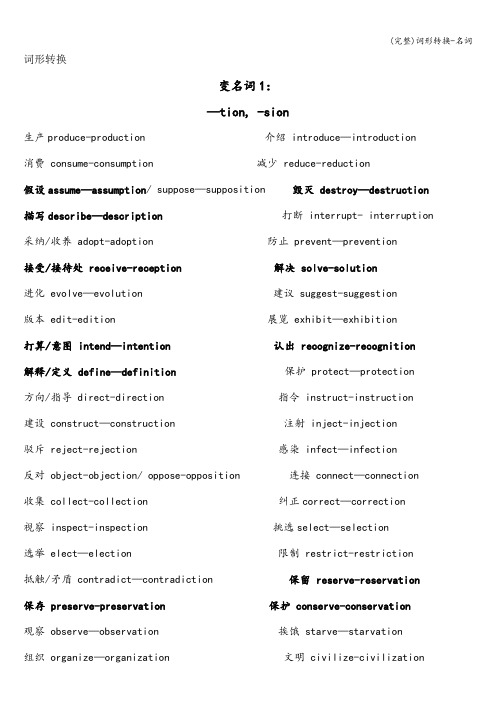
词形转换变名词1:—tion, -sion生产produce-production 介绍 introduce—introduction 消费 consume-consumption 减少 reduce-reduction假设assume—assumption/ suppose—supposition 毁灭 destroy—destruction 描写describe—description打断 interrupt- interruption 采纳/收养 adopt-adoption 防止 prevent—prevention接受/接待处 receive-reception解决 solve-solution进化 evolve—evolution 建议 suggest-suggestion版本 edit-edition 展览 exhibit—exhibition打算/意图 intend—intention认出 recognize-recognition解释/定义 define—definition 保护 protect—protection方向/指导 direct-direction 指令 instruct-instruction建设 construct—construction 注射 inject-injection驳斥 reject-rejection 感染 infect—infection反对 object-objection/ oppose-opposition 连接 connect—connection收集 collect-collection 纠正correct—correction视察 inspect-inspection 挑选select—selection选举 elect—election 限制 restrict-restriction抵触/矛盾 contradict—contradiction 保留 reserve-reservation保存 preserve-preservation 保护 conserve-conservation观察 observe—observation 挨饿 starve—starvation组织 organize—organization 文明 civilize-civilization认识 realize—realization 考试 examine—examination决定 determine-determination 形成 form-formation通知 inform—information 想象 imagine—imagination运输 transport—transportation 邀请 invite—invitation期待 expect-expectation 诱惑 tempt-temptation改编/适应 adapt-adaption 移民 immigrate-immigration模仿 imitate—imitation 准备 prepare—preparation探索explore—exploration 考虑 consider—consideration宣布 declare-declaration 装饰 decorate-decoration变名词2—tion, -sion灵感 inspire-inspiration 放松 relax-relaxation交流 communicate-communication 占用/职业 occupy—occupation满足 satisfy—satisfaction 申请/应用 apply—application 暗示 imply-implication 推荐 recommend—recommendation翻译/说明 interpret-interpretation 结合 combine-combination操作/手术 operate-operation 犹豫 hesitate—hesitation教育 educate—education 位于 locate-location表明 indicate-indication 参加 participate—participation 计算 calculate—calculation 欣赏/感激 appreciate—appreciation联想/协会 associate-association 分离 separate-separation冬眠 hibernate-hibernation 赔偿 compensate—compensation 调查 investigate-investigation 庆祝 celebrate-celebration祝贺 congratulate—congratulation 翻译 translate—translation 积累 accumulate-accumulation 加速 accelerate—acceleration捐赠 donate-donation 解放 liberate-liberation动力 motivate—motivation 革新 innovate-innovation集中 concentrate-concentration 游行/示威 demonstrate-demonstration 贡献 contribute-contribution 分发 distribute—distribution 促进 promote—promotion 奉献 devote-devotion沮丧 frustrate-frustration/ depress-depression 印象 impress-impression表达 express-expression 拥有/财产 possess—possession讨论 discuss—discussion 扩大 expand—expansion延伸 extend—extension 承认 admit-admission允许 permit—permission 排放 emit—emission爆炸 explode—explosion 结论 conclude—conclusion决定 decide-decision 分开 divide—division迷惑 confuse—confusion变名词3-ence,—ance存在 exist-existence 不同 differ—difference 发生 occur—occurrence 查阅/参考 refer-reference 更喜欢/偏好 prefer—preference接受 accept—acceptance 出现/外表 appear—appearance执行/表演 perform-performance 抵制 resist—resistance指导 guide—guidance 进入 enter-entrance保险 insure-insurance 帮助 assist-assistance忍受 endure-endurance/ tolerate—tolerance-ment广告 advertise-advertisement 同意 agree-agreement惊奇amaze—amazement 吃惊 astonish—astonishment通告 announce-announcement 安排 arrange-arrangement评估 assess-assessment 发展 develope—development失望 disappoint—disappointment 雇用/就业 employ-employment鼓舞 encourage-encouragement 款待/娱乐 entertain—entertainment装备 equip—equipment 统治/政府 govern-government改进 improve—improvement 投资 invest—investment卷入 involve-involvement 管理 manage—management惩罚 punish-punishment 要求 require—requirement退休 retire—retirement 定居/定居处 settle—settlement陈述 state—statement 对待/治疗 require—requirement 以…为基础/地下室 base—basement 人行道 pave—pavement完成/成就 achieve-achievement/ accomplish—accomplishment-ness (adj。
四年级下册语文,词形转换

当涉及到词形转换时,以下是一些常见的方式:
1. 名词变动词:可以通过在名词前加上动词"做"、"成为"等来转换为动词形式。
示例:书 → 读书、学生 → 学生们学习。
2. 动词变名词:可以通过在动词前加上"的"、"者"等来转换为名词形式。
示例:游泳 → 游泳的人、跳跃 → 跳跃者。
3. 形容词变副词:可以在形容词后面加上"地"来转换为副词形式。
示例:快 → 快地、高兴 → 高兴地。
4. 形容词变名词:可以通过在形容词前面加上"的"、"性"等来转换为名词形式。
示例:美丽 → 美丽的风景、勇敢 → 勇敢的行为。
5. 动词变形容词:可以通过在动词前加上"的"、"性"等来转换为形容词形式。
示例:疲倦 → 疲倦的身体、吸引 → 吸引人的特点。
词汇学-词性转换法

02 应对四六级考试中词汇运用和语法结构的考察。
在翻译实践中的应用前景
通过词性转换法,准确传 达原文含义,保持译文流 畅自然。
丰富译文的表达方式和语 言风格,提高翻译质量。
应对不同语言间的词性差 异,提高翻译的灵活性和 准确性。
THANKS
感谢观看
副词转换为形容词
技巧:在副词后加上适当的形容词词 缀,如“-able”、“-ive”等,可以
将其转换为形容词。
"possible"原为副词,表示“可能 地”,去掉词缀“-ly”后变为形容词
"possible",表示“可能的”。
实例
"active"原为副词,表示“积极地”, 去掉词缀“-ly”后变为形容词 "active",表示“积极的、活跃的”。
形容词转换为副词
技巧:在形容词前加 上适当的副词词缀,
如“-ly”、“wise”等,可以将其
转换为副词。
实例
"quick"原为形容词, 表示“快速的”,加 上词缀“-ly”后变为 副词"quickly",表示
“快速地”。
"wise"原为形容词, 表示“明智的”,加 上词缀“-ly”后变为 副词"wisely",表示 “明智地、聪明地”。
动词转换为名词
技巧:在动词后加上适当的名词词缀,如“-tion”、 “-ment”、“-ance”等,可以将其转换为名词。
输标02入题
实例
01
03
"perform"原为动词,表示“表演、执行”,加上词 缀“-ance”后变为名词"performance",表示“表
高中英语高考词性转换汇总(5类词形转换+7组核心词汇转换)

高考英语词性转换一、词形转换(一)形容词→副词形容词变副词的一般情况1.(2019·全国Ⅱ卷)final最终的→finally终于2.(2018·全国Ⅱ卷、2014·全国Ⅰ卷)actual真实的→actually 实际上3.(2016·全国Ⅰ卷)official正式的→officially正式地4.(2016·全国Ⅲ卷)gradual逐渐的→gradually 逐渐地tips:关于形容词词尾l,同学们怕是有很多误会,要知道变副词时:"ll"结尾加-y,如full→fully,dull→dully;"le"结尾e改y, 高中阶段只有whole→wholly是例外。
记住以上两点,千万别看到l就加y!5.(2020全国Ⅲ卷)gentle温和的→gently 温和地6.(2019·全国Ⅲ卷)huge巨大的→hugely极度;非常,深深地tips:形变副规律中"元音字母+e"去e加-ly,关于这点只要记住高中阶段的true→truly,注意“辅音字母+e”变副词,不可去掉e!7.(2021年1月浙江卷)sharp锋利的→sharply明显地8.(2020年1月浙江卷)particular特别的→particularly尤其9.(2020全国Ⅰ卷)extreme极度的→extremely非常地10.(2019·全国Ⅰ卷)poor贫穷的,贫乏的→poorly不足11.(2017·全国Ⅱ卷)fair相当大的→fairly相当地12.(2017·全国Ⅲ卷)certain确定→certainly无疑,确定13.(2016·全国Ⅱ卷、2015·全国Ⅰ卷)regular有规律的→regularly有规律地14.(2015·全国Ⅱ卷)slow慢的→slowly 缓慢地15.(2014·全国Ⅱ卷)sudden突然的→suddenly 突然16.(2021八省联考)specific——specificallytips:除了上述规则外,还要记住它:1.以y结尾的形容词:"辅音字母+y"改i加-ly,如:merry→merrily;如果y的读音同“爱”,直接加-ly,如:shy→shyly。
英语词性转换大全

英语词性转换大全英语词性转换1. 名词变形容词(a)在名词后面加-y可以变成形容词(尤其是一些与天气有关的名词)例如:rain—rainy,cloud—cloudy, wind—windy, snow—snowy,health—healthy, luck—lucky,anger—angry guilt—guilty(内疚的) tourist—touristy (游客多的), salt (盐)—salty (咸的)silk(丝绸)—silky(丝绸般的), sleep—sleepy (昏昏欲睡的)注意:1)如果以重读闭音节结尾,且词尾只有一个辅音字母,这时应双写辅音字母再加“-y”。
如: sun—sunny, fun—funny, fog—foggy (有雾的), fur—furry(毛皮的)2)少数以不发音的e结尾的名词变为形容词时,应去掉e再加“-y”。
如: noise—noisy, ice—icy, shine—shiny (发亮的), taste(口味)—tasty(甜的)(b)名词后面加-ed,以e结尾的直接加d。
例如: spot(斑点)—spotted(有斑点的);talent—talented (有天赋的) organize—organized 有组织的; balance—balanced(平衡的)(c)一些抽象名词在词尾加-ful可以变为形容词例如:care—careful, thank—thankful, help —helpful,use—useful, meaning—meaningful(d)在名词后加-less构成含有否定意义的形容词例如:care—careless(粗心的), use—useless (无用的)hope—hopeless(没希望的),home—homeless (无家可归的)(e)一些以-ce结尾的名词,把-ce改为-t变成形容词例如: difference—different, silence—silent, confidence—confident(f)。
英语词性转换大全
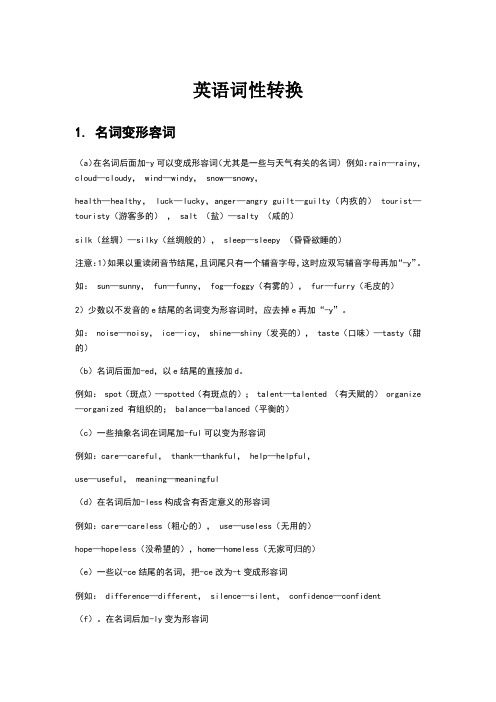
英语词性转换1. 名词变形容词(a)在名词后面加-y可以变成形容词(尤其是一些与天气有关的名词)例如:rain—rainy,cloud—cloudy, wind—windy, snow—snowy,health—healthy, luck—lucky,anger—angry guilt—guilty(内疚的) tourist—touristy(游客多的), salt (盐)—salty (咸的)silk(丝绸)—silky(丝绸般的), sleep—sleepy (昏昏欲睡的)注意:1)如果以重读闭音节结尾,且词尾只有一个辅音字母,这时应双写辅音字母再加“-y”。
如: sun—sunny, fun—funny, fog—foggy(有雾的), fur—furry(毛皮的)2)少数以不发音的e结尾的名词变为形容词时,应去掉e再加“-y”。
如: noise—noisy, ice—icy, shine—shiny(发亮的), taste(口味)—tasty(甜的)(b)名词后面加-ed,以e结尾的直接加d。
例如: spot(斑点)—spotted(有斑点的); talent—talented (有天赋的) organize —organized 有组织的; balance—balanced(平衡的)(c)一些抽象名词在词尾加-ful可以变为形容词例如:care—careful, thank—thankful, help—helpful,use—useful, meaning—meaningful(d)在名词后加-less构成含有否定意义的形容词例如:care—careless(粗心的), use—useless(无用的)hope—hopeless(没希望的),home—homeless(无家可归的)(e)一些以-ce结尾的名词,把-ce改为-t变成形容词例如: difference—different, silence—silent, confidence—confident(f)。
词性转换
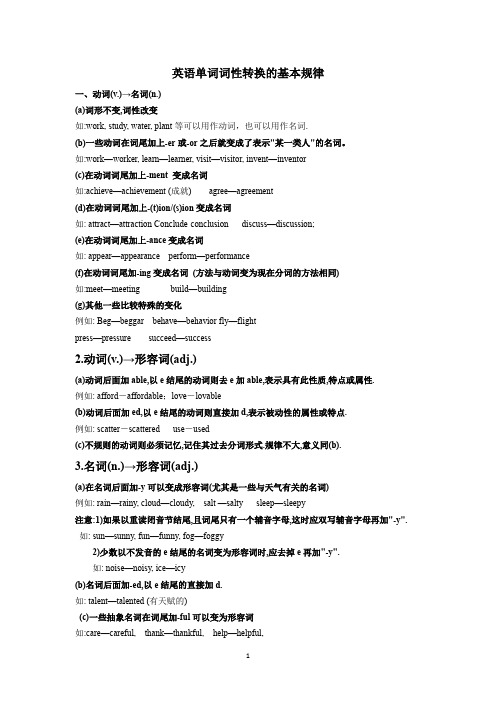
英语单词词性转换的基本规律一、动词(v.)→名词(n.)(a)词形不变,词性改变如:work, study, water, plant等可以用作动词,也可以用作名词.(b)一些动词在词尾加上-er或-or之后就变成了表示"某一类人"的名词。
如:work—worker, learn—learner, visit—visitor, invent—inventor(c)在动词词尾加上-ment 变成名词如:achieve—achievement (成就) agree—agreement(d)在动词词尾加上-(t)ion/(s)ion变成名词如: attract—attraction Conclude-conclusion discuss—discussion;(e)在动词词尾加上-ance变成名词如: appear—appearance perform—performance(f)在动词词尾加-ing变成名词(方法与动词变为现在分词的方法相同)如:meet—meeting build—building(g)其他一些比较特殊的变化例如: Beg—beggar behave—behavior fly—flightpress—pressure succeed—success2.动词(v.)→形容词(adj.)(a)动词后面加able,以e结尾的动词则去e加able,表示具有此性质,特点或属性.例如: afford-affordable;love-lovable(b)动词后面加ed,以e结尾的动词则直接加d,表示被动性的属性或特点.例如: scatter-scattered use-used(c)不规则的动词则必须记忆,记住其过去分词形式.规律不大,意义同(b).3.名词(n.)→形容词(adj.)(a)在名词后面加-y可以变成形容词(尤其是一些与天气有关的名词)例如: rain—rainy, cloud—cloudy, salt —salty sleep—sleepy注意:1)如果以重读闭音节结尾,且词尾只有一个辅音字母,这时应双写辅音字母再加"-y".如: sun—sunny, fun—funny, fog—foggy2)少数以不发音的e结尾的名词变为形容词时,应去掉e再加"-y".如: noise—noisy, ice—icy(b)名词后面加-ed,以e结尾的直接加d.如: talent—talented (有天赋的)(c)一些抽象名词在词尾加-ful可以变为形容词如:care—careful, thank—thankful, help—helpful,use—useful, meaning—meaningful(d)在名词后加-less构成含有否定意义的形容词例如:care—careless, use—uselesshope—hopeless,home—homeless(e)一些以-ce结尾的名词,把-ce改为-t变成形容词例如: difference—different, silence—silent, confidence—confident(f).在名词后加-ly变为形容词例如: friend—friendly, love—lovely, live---lively(g).在名词后加-ous变为形容词例如: danger—dangerous humor—humorous(h)名词后面加-al变为形容词例如: music—musical; medicine—medical (这个比较特殊)(i)名词后面加-able变为形容词,如果以e结尾就去e再加"-able".例如: adjust—adjustable 可调整的value—valuable有价值的(j)名词后面加-en变成形容词例如: wood—wooden 木制的wool—woolen 羊毛的(k)一些表示国家的名词可以在词尾加-ese, -ish或-n构成表示国籍,语言的形容词例如:China—Chinese, England—English,America—American, Australia —Australian(注意Canada—Canadian)4..形容词(adj.)→副词(adv.)▲一般在形容词的词尾加-ly可以变成副词例如: quick—quickly, slow—slowly, loud—loudly, sudden—suddenly 等但是,以下几点值得注意:(a) 一些以"辅音字母+y"结尾的形容词,要把y改为i再加-ly例如: happy—happily, angry—angrily, lucky—luckily, heavy—heavily, noisy—noisily (b) 有些以-ble或-le结尾的形容词,去掉e加-y例如:possible—possibly, terrible—terribly(c)少数以e结尾的形容词,要去掉e再加-ly例如: true—truly但绝大多数以e结尾的形容词仍然直接加-ly 例如: polite—politely, wide—widely (d)以-l结尾的形容词变为副词时要在词尾加-ly,以-ll结尾的才在词尾只加-y.例如: usual—usually, careful—carefully, useful—usefullyfull—fully (以-ll结尾的才只加y)。
(完整版)英语词性转换归纳
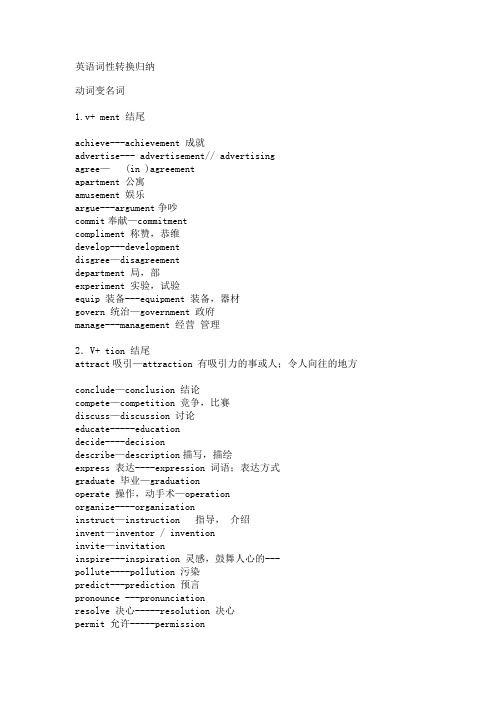
英语词性转换归纳动词变名词1.v+ ment 结尾achieve---achievement 成就advertise--- advertisement// advertisingagree— (in )agreementapartment 公寓amusement 娱乐argue---argument争吵commit奉献—commitmentcompliment 称赞,恭维develop---developmentdisgree—disagreementdepartment 局,部experiment 实验,试验equip 装备---equipment 装备,器材govern 统治—government 政府manage---management 经营管理2.V+ tion 结尾attract吸引—attraction 有吸引力的事或人;令人向往的地方conclude—conclusion 结论compete—competition 竞争,比赛discuss—discussion 讨论educate-----educationdecide----decisiondescribe—description描写,描绘express 表达----expression 词语;表达方式graduate 毕业—graduationoperate 操作,动手术—operationorganize----organizationinstruct—instruction 指导,介绍invent—inventor / inventioninvite—invitationinspire---inspiration 灵感,鼓舞人心的---pollute----pollution 污染predict---prediction 预言pronounce ---pronunciationresolve 决心-----resolution 决心permit 允许-----permissionsuggest-建议,暗示--suggestionsolve解决-----solution 解决方法3.V+ ance 结尾appear—appearance 外貌,出现perform----performance 演出4.V+ ing 结尾bathe 洗澡---bathingend 结束----ending 结尾,结局train 训练---trainingmean ---- meaning 意义say-----saying 谚语5.V+ 其他Beg(乞讨)—beggar 乞丐behave 行为,举止----behaviorknow---knowledgefly—flight 飞行heat 加热---heat 热量hit 撞击------hit 轰动一时的人或物,碰撞mix 混合-----mixture 混合物press 按,压—pressure 压力sit-----seat 座位succeed-- successtour 在-----旅游,在-----作巡回演出直接+地点 tour China ---tour 旅游/ tourist 游客名词变形容词1名词+yAnger 生气-----angryhunger---hungryfog—foggy有雾的fur----furry 毛皮的guilt 罪恶---guilty 内疚的health---healthyluck---luckycloud---cloudywind—windyrain---rainysnow---snowysun—sunnytourist------touristy 游客多的business---busysalt 盐--- salty 咸的shine---shiny 发亮的silk 丝绸—silky 丝绸般的sleep---sleepy 昏昏欲睡的taste 口味,品味------tasty 甜的2.名词+ edbalance –balanced 平衡的spot 斑点,地点----spotted 有斑点的talent-----talented 有天赋的organized 有组织的distusted 厌恶的offended 生气的crowded 拥挤的polluted 被污染的pleased 高兴的3.名词+ ful/lessmeaning—meaningful 有意义的care—careful/ careless 小心的;粗心的help---helpful / helpless home—homeless 无家可归的colour---colourfulpain 疼痛---painful 痛苦的use---useless/ usefulthank—thankful 充满感激的peace 和平 ---- peaceful 平静的,宁静的playful 顽皮的,爱玩耍的4.名词+ ableadjustable 可调整的comfort---comfortableknowledge---knowledgeablesuit 一套-----suitable 合适的5.名词+ ousenormous 巨大的danger—dangerousmystery 神秘-----mysterious 神秘的6.ce 变 tconfidence----confidentdifference---different7. al 结尾medicine 药----medical 医学的music---musicalnature---natural 自然的person---personal (私人的) nation—national 国家的education---educational有教育意义的tradition----traditional 传统的origin起源---original 新颖的;独创的8.名词+ lyfriend—friendlylive---lively 活跃的,有生气的love—lovely 可爱的9.+ en 结尾wood—wooden 木制的wool—woolen 羊毛的10. 其他energy精力---energeticfool 傻子—foolish 愚蠢的freedom 自由—free 空的,免费的height 高度—highillness 疾病--- illlove—loving 慈爱的death---deadpleasure---pleasant / pleased popularity 流行性—popularpride---proudscientist----scientific 科学的方位的词表达名词—形容词East—easternWest—westernSouth—southernNorth---northernIn the west of ChinaIn the western part of China四大洲名词-----形容词Asia 亚洲–---- AsianAfrica 非洲----- AfricanEurope欧洲----- EuropeanAmerica 美洲-----American形容词变副词1.形容词+ lybad—badlybright—brightly 明亮地casual—casually 随意地clear—clearly 清楚地complete—completely 完全correct---correctly 正确地final--finallyfortunate—fortunately幸运地general—generally 一般来讲loud—loudlyparticular 特殊的,独特的—particularly polite—politelyproper 合适的-,恰当的---properlymain------mainly 主要地most 多数-----mostly 多半,大多数normal---normally 正常地quick—quicklyquiet—quietly 轻轻地,安静地real—reallyrecent 最近的----recently 最近;近来hard 难的;努力地---hardly 几乎不late 迟的—lately 最近;近来sad--sadlyslow---slowlyspecial—specially 专门,特殊地specific---specifically 特定地,明确地strong—strongly 坚决地,强烈地sudden—suddenly突然usual—usually2. 以le 结尾的去e + ycomfortable---comfortablygentle—gentlypossible---possiblysimple ----simply 仅仅;只;简单地terrible---terribly3. 辅音字母+ y 变 ilyeasy—easilyheavy—heavilyhappy--happily4.特殊good—well好地 well 身体健康的,井true—truly名词---形容词—副词beauty 美,美人—beautiful—beautifully care—careful—carefully care—careless—carelesslydifference---different---differently happiness—happy—happily hunger—hungry--hungrily health—healthy—healthily luck—lucky—luckily noise—noisy—noisily pride—proud—proudly骄傲地sadness—sad—sadlysafety 安全;安全的地方—safe—safely silence—silent---silently 默默地success—successful—successfully truth—true—truly unluck—unlucky—unluckilywonder 奇迹—wonderful—wonderfully既是形容词又是副词early get up early ;an early trainlate be late for classcome late for schooldeep dive deep into the seaa hole deep largehigh jump high;a high mountainhard a hard question;a hard stone work hard / study hardrain hardlong It takes too longIt takes a long timefar jump farMy home is far from school straight a straight linego straight along here(1)v.-n.动词转化为名词,post-postage mail-mailweigh-weight advise-advice(2)v.-n.-a.动词转化成名词-形容词act-actor / actress-activechange-change-changeable(3) v.-a.-ad.-n.动词转化成形容词,副词,名词fill-fullneed-necessary-necessarilyinterest(v. / n.) interested /interesting (4)n. a. n. a.名词转化为形容词person personal ( 个人的; 私人的)fun funny(5)n. pl. n. pl.名词转化为名词复数gentleman gentlemen human humans(6)a. ad. a. ad.形容词转化为副词possible possibly probable probably(7)a. ad. n.形容词转化为副词,名词true truly truthlucky luckily luck(8)原级比较级最高级far farther / further farthest / furthestlittle less least一、名词变为形容词的方法1. 在名词后面加-y可以变成形容词(尤其是一些与天气有关的名词)。
词性转换的技巧
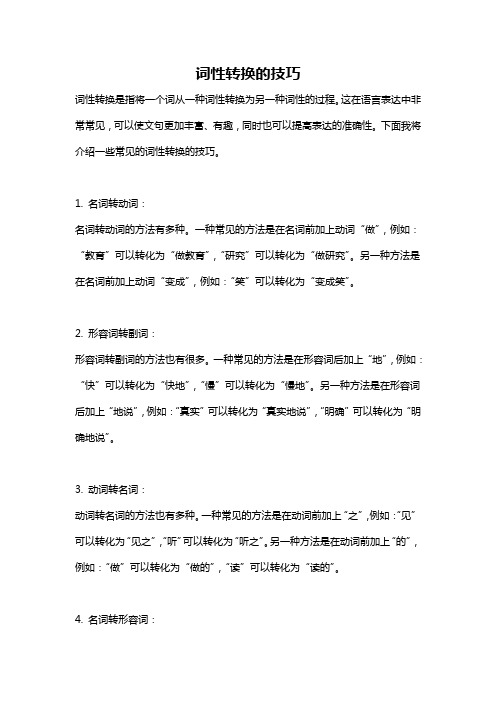
词性转换的技巧词性转换是指将一个词从一种词性转换为另一种词性的过程。
这在语言表达中非常常见,可以使文句更加丰富、有趣,同时也可以提高表达的准确性。
下面我将介绍一些常见的词性转换的技巧。
1. 名词转动词:名词转动词的方法有多种。
一种常见的方法是在名词前加上动词“做”,例如:“教育”可以转化为“做教育”,“研究”可以转化为“做研究”。
另一种方法是在名词前加上动词“变成”,例如:“笑”可以转化为“变成笑”。
2. 形容词转副词:形容词转副词的方法也有很多。
一种常见的方法是在形容词后加上“地”,例如:“快”可以转化为“快地”,“慢”可以转化为“慢地”。
另一种方法是在形容词后加上“地说”,例如:“真实”可以转化为“真实地说”,“明确”可以转化为“明确地说”。
3. 动词转名词:动词转名词的方法也有多种。
一种常见的方法是在动词前加上“之”,例如:“见”可以转化为“见之”,“听”可以转化为“听之”。
另一种方法是在动词前加上“的”,例如:“做”可以转化为“做的”,“读”可以转化为“读的”。
4. 名词转形容词:名词转形容词的方法有多种。
一种常见的方法是在名词后加上“的”,例如:“困难”可以转化为“困难的”,“美丽”可以转化为“美丽的”。
另一种方法是在名词前加上“具有”,例如:“价值”可以转化为“具有价值的”,“特点”可以转化为“具有特点的”。
5. 副词转动词:副词转动词的方法也有多种。
一种常见的方法是在副词后加上动词“做”,例如:“迅速”可以转化为“迅速做”,“安静”可以转化为“安静做”。
另一种方法是在副词后加上动词“变成”,例如:“成形”可以转化为“变成成形”,“明亮”可以转化为“变成明亮”。
6. 状语转形容词:状语转形容词的方法也有多种。
一种常见的方法是在状语前加上形容词“是”,例如:“完全”可以转化为“是完全的”,“不可避免”可以转化为“是不可避免的”。
另一种方法是在状语前加上形容词“之”,例如:“明显”可以转化为“之明显”,“难以置信”可以转化为“之难以置信”。
小学英语常见词形转换

词形转换1 动词→名词㈠ v.﹢(e)r(以e结尾的只加-r),一般表示动作的执行者。
如:1 build建造—builder建筑工人2 clean清理 ---cleaner清洁工3 dance跳舞---dancer舞蹈演员4 drive驾驶—driver司机5 farm种地---farmer农民6 learn学习—learner学员7 play玩---player运动员 8 read阅读—reader 读者9 run跑---runner跑步运动员 10 sing唱歌—singer歌唱演员11 speak演说---speaker演说家 12 swim游泳--swimmer游泳运动员13 teach教---teacher教师 14 tell告诉---teller叙述者15 travel旅游—traveler游客 16 win胜利--winner胜利者17 work工作—worker工人 18 write写—writer作家19 wait等候—waiter服务员 20 act动作—act or演员其他变化:sit坐—seat座位2名词→形容词⑴n.﹢-y1 sun太阳---sunny晴朗的2 cloud云—cloudy多云的3 wind风---windy有风的4 rain雨—rainy 下雨的5 snow雪---snowy下雪的6 fog雾—foggy 有雾的7 fun趣味---funny有趣的 8 luck 运气—lucky幸运的9 noise噪音—noisy吵闹的 10 ice冰---icy 有冰的⑵n.﹢-ful1 care小心—careful小心的2 colour 颜色—colourful 彩色的2 help帮助—helpful有帮助的3 use 用处--useful有用的4 wonder精彩—wonderful很棒的 6 beauty美丽—beautiful美丽的⑶国家名称词﹢ese/﹙ia﹚n等,变为相应的形容词。
词形变换

surround → surrounding 周围的事物;环境
• 5. v+ al refuse → refusal 拒绝 propose → proposal 建议 arrive → arrival 到达 approve → approval 赞成 survive → survival 幸存/survivor 幸存者 • 6. v + ence exist → existence 存在 refer → reference参考 prefer → preference喜欢 differ → difference 差异;不同
• -ation organize → organization 组织 invite → invitation 邀请 inspire → inspiration 灵感,鼓舞人心 pronounce → pronunciation 发音 apply → application申请/applicant 申请人 occupy → occupation 职业 explain → explanation 解释 expect → expectation 期望 observe → observation 观察 determine → determination 决心
thoughtful 关切的;体贴的;深思的 stressful 产生压力的; 紧张的 merciful 仁慈的;慈悲的 faithful 忠实的 regretful 后悔的 forgetful 健忘的 respectful 恭敬的
inventions (invent). __________
5.The boy having the appearance __________ (appear) of being half starved disappeared, never to be seen again.
总结词形转换

总结词形转换什么是词形转换?词形转换,又称为词形变化,是指通过改变词的形态,如词尾、词首、词中元音或辅音的变化等方式,从而改变词的词性、时态、语态、人称等特征的过程。
词形转换是语言学中一个重要的领域,它在语法和词法研究中扮演着关键的角色。
在英语和其他许多语言中,词形转换是一种常见的语言现象。
词形转换的种类1. 名词的词形转换名词的词形转换包括单数转复数、所有格、名词性提问词等。
例如:•单数转复数:cat(猫) -> cats(猫们)•所有格:dog(狗) -> dog’s(狗的)•名词性提问词:who(谁)-> whose(谁的)2. 动词的词形转换动词的词形转换包括时态、语态、人称等。
例如:•时态:run(跑) -> ran(跑过)- ran(跑)•语态:make(制作) -> made(被制作)•人称:have(有) -> has(有)3. 形容词的词形转换形容词的词形转换包括比较级、最高级等。
例如:•比较级:good(好) -> better(更好)•最高级:happy(幸福) -> happiest(最幸福)4. 副词的词形转换副词的词形转换包括比较级、最高级等。
例如:•比较级:fast(快速) -> faster(更快)•最高级:quickly(迅速地) -> quickest(最迅速地)词形转换的重要性和应用词形转换在语言表达中起着重要的作用。
通过改变词的形式,我们能够表达不同的时态、人称、语态等意义,从而丰富语言的表达能力。
此外,词形转换也有助于理解和解读他人的语言表达。
在写作中,正确地使用词形转换可以提升文章的表达能力和语言流畅度。
合理使用名词、动词、形容词和副词的不同词形变化,可以使文章更加精确、丰富和生动。
在学习语言的过程中,掌握词形转换也是非常重要的。
通过学习名词、动词、形容词和副词的不同词形变化规律,我们能够更好地理解和掌握语言的使用,提高自己的语言表达能力。
词性转换翻译

词性转换翻译词性转换是英语语法中的一个重要概念,它指的是将一个单词从一种词性转变为另一种词性。
通常,词性转换是通过添加前缀、后缀、改变词形或使用不同的词根来完成的。
下面是一些常见的词性转换及其翻译例子。
1. 名词转动词名词可以通过加上动词缀-ize或-ify转化为动词。
例如:- Noun (名词): hospital (医院)- Verb (动词): hospitalize (住院)2. 形容词转动词形容词可以通过加上动词缀-en或-ify转化为动词。
例如:- Adjective (形容词): soft (柔软的)- Verb (动词): soften (变软)3. 动词转名词动词可以通过添加名词后缀-er或-or转化为名词。
例如:- Verb (动词): sing (唱歌)- Noun (名词): singer (歌手)4. 形容词转名词形容词可以通过添加名词后缀-ness或-ity转化为名词。
例如:- Adjective (形容词): happy (快乐的)- Noun (名词): happiness (快乐)5. 名词转形容词名词可以通过添加形容词后缀-al或-ous转化为形容词。
例如:- Noun (名词): music (音乐)- Adjective (形容词): musical (音乐的)6. 动词转形容词动词可以通过添加形容词后缀-ing或-ed转化为形容词。
例如:- Verb (动词): interest (感兴趣)- Adjective (形容词): interesting (有趣)7. 名词转副词名词可以通过添加副词后缀-ly转化为副词。
例如:- Noun (名词): quick (快)- Adverb (副词): quickly (快速地)8. 形容词转副词形容词可以通过添加副词后缀-ly转化为副词。
例如:- Adjective (形容词): careful (小心的)- Adverb (副词): carefully (小心地)词性转换在英语中非常常见,掌握这些转换规则可以帮助我们更好地理解和表达英语。
2022年高考可能考到的词形转换
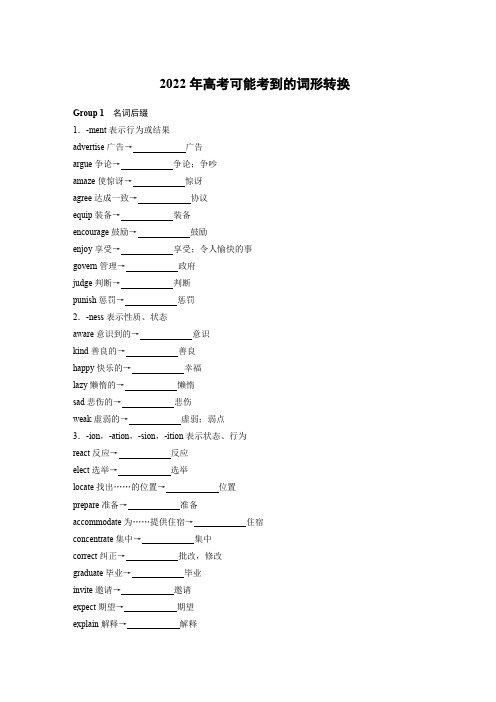
2022年高考可能考到的词形转换Group 1名词后缀1.ment表示行为或结果advertise广告→广告argue争论→争论;争吵amaze使惊讶→惊讶agree达成一致→协议equip装备→装备encourage鼓励→鼓励enjoy享受→享受;令人愉快的事govern管理→政府judge判断→判断punish惩罚→惩罚2.ness表示性质、状态aware意识到的→意识kind善良的→善良happy快乐的→幸福lazy懒惰的→懒惰sad悲伤的→悲伤weak虚弱的→虚弱;弱点3.ion,ation,sion,ition表示状态、行为react反应→反应elect选举→选举locate找出……的位置→位置prepare准备→准备accommodate为……提供住宿→住宿concentrate集中→集中correct纠正→批改,修改graduate毕业→毕业invite邀请→邀请expect期望→期望explain解释→解释communicate交流→交流pronounce发音→发音organize组织→组织combine结合→结合(体)admit承认;准许……进入;接纳→准许加入;承认;入场费permit允许→允许conclude推断→结论decide决定→决定discuss讨论→讨论express表达→表达;表情impress给……深刻印象→印象possess占有→具有,拥有;(pl.)个人财产recognize认出→认可4.y,ty,ity,bility,cy,ry,ety 表示性质、状态discover发现→发现injure伤害→损伤recover恢复→恢复honest诚实的→诚实deliver发表;递送→递送difficult困难的→困难safe安全的→安全cruel残忍的→残忍real真的→现实creative有创造力的→创造力similar相似的→相似disable使……残疾→残疾fluent流利的→流利frequent频繁的→频率tend倾向于→趋势efficient高效的→效率urgent紧急的→紧急情况responsible负责的→责任possible可能的→可能性brave勇敢的→勇敢5.ance或ence 表示性质、状况、行为等appear出现→出现,外表accept接受→接受assist帮助→援助guide指导→指导important重要的→重要性significant重要的→重要性exist存在→存在prefer更喜欢→偏爱;优先权refer提及;参考→提及;查询different不同的→不同silent沉默的→沉默independent独立的→独立confident自信的→信心,信任patient耐心的→耐心intelligent聪明的→智力;才智evident明显的→证据absent缺席的→缺席present在场的→出席violent暴力的→暴力6.th表示过程、结果、性质、状态grow生长→成长warm温暖的→温暖strong强壮的→力量dead死的→死亡deep深的→深度;深处wide宽的→宽度long长的→长度true真的→真实;真理young年轻的→青春,年轻7.er,or,ar表示做某事的人或物announce宣告→宣告者;播音员begin开始→初学者employ雇佣→雇主research研究→研究员explore探索→探索者interpret翻译→口译工作者compete竞争→竞争者conduct指挥→指挥create创造→创造者direct指导→导演educate教育→教育工作者edit编辑→编者invent发明→发明家translate翻译→翻译家sail航行→水手survive幸存→幸存者visit参观→参观者beg乞讨→乞丐lie撒谎→说谎者8.ist表示……家或……主义者art艺术→画家biology生物→生物学家chemistry化学→化学家journal日志→记者physics物理→物理学家piano钢琴→钢琴家type打字→打字员violin小提琴→小提琴家real真的→现实主义者social社会的→社会主义者optimism乐观主义→乐观主义者9.age表示行为或行为的结果、费用、状态等marry结婚→婚姻pack打包→包裹post邮递→邮资percent百分比的→百分比short缺乏的→短缺10.ure,ture表示行动、过程、结果fail失败→失败(者)press压,按→压力please使愉悦→高兴mix混合→混合物11.ing表示动作、过程begin开始→开端meet遇见→会议,相遇feel感觉→触觉;(复数)感情mean意味着→意义skate滑冰→滑冰swim游泳→游泳paint绘画→绘画end结束→结尾belong属于→所属物品;财产surround包围→环境12.ian表示身份music音乐→音乐家library图书馆→图书管理员13.al表示过程、状态arrive到达→到达approve同意→赞成refuse拒绝→拒绝survive幸存→幸存14.ship表示性质、事物friend朋友→友谊relation关联→关系hard困难的→苦难leader领导人→领导partner合伙人→伙伴关系scholar学者→奖学金15.dom表示状态bore使厌烦→厌烦free自由的→自由wise明智的→智慧16.其他名词变形relieve缓解→减轻high高的→高度tour旅游→旅游业Group 2形容词后缀1.able以“able”结尾的形容词一般有两种情况:(1)v.+able→adj.“能……的”“可以(被)……的”“值得……的”rely依靠→可靠的admire钦佩→令人钦佩的change变化→多变的enjoy享受→令人愉快的suit适合→合适的believe相信→可以信赖的(2)n.+able→adj.“具有……特点的”value价值→有价值的comfort舒适→舒适的favour赞成→赞成的(3)ible该词缀在意义上与“able”相同terror恐怖→可怕的horror恐怖→可怕的access(使用或见到的)机会→可进入/到达/使用的2.n.+ful “充满……的”“有……性质的”colour颜色→多彩的help帮助→有帮助的power力量→强有力的use用处→有用的doubt怀疑→怀疑的joy高兴→高兴的peace和平→和平的forget忘记→健忘的thank感谢→感激的mercy怜悯→怜悯的harm伤害→有害的3.n.+less “无”“缺”fear恐惧→无畏的harm伤害→无害的use用处→无用的help帮助→无助的care小心→粗心的limit限制→无限的hope希望→绝望的aim目标→漫无目的的self自我→无私的meaning 意义→无意义的4.n.+al或n.+ial“属于……的”“有……特性的”accident事故,意外;偶然→意外的universe宇宙→普遍(存在)的person人→个人的origin起源→最初的;独创的music音乐→音乐的practice实践→实际的;可行的season季节→季节性的office办公室→官方的,正式的benefit益处→有益的face脸→面部的5.n.+ive 或v.+ive “……的”“与……有关的”“具有……性质的”create创造→有创造力的instruct教导→教育性的attract吸引→吸引人的protect保护→保护的imagine想象→富于想象力的impress使留下印象→令人印象深刻的appreciate感激→感激的6.(1)v.+ed “有……的”“有……特征的”engage(使)参与→忙碌的limit限制→有限的marry结婚→已婚的unite(使)团结→联合的wound使受伤→受伤的determine决心→坚定的organize组织→有组织的age变老→年迈的qualify使合格→合格的(2)v.+ed“感到……的”,v.+ing“令人……的”worry使担心→感到担心的→令人担心的excite使激动→激动的→令人兴奋的interest使感兴趣→感兴趣的→有趣的discourage使灰心→灰心的→令人灰心的satisfy使满意→感到满意的→令人满意的tire使劳累→劳累的→累人的amuse使开心→被逗笑的;愉快的→有趣的bore使厌烦→感到厌倦的→令人厌烦的7.n.+y“充满……的”“有……特征的”“有……倾向的”greed贪婪→贪婪的hunger饥饿→饥饿的thirst渴→口渴的health健康→健康的anger愤怒→愤怒的fun乐趣→好笑的smell气味→难闻的fog雾→有雾的storm暴风雨→有暴风雨的hill小山→多山的mud泥泞→泥泞的noise噪音→喧闹的8.ly“具有……性质的”“每隔……时间”week星期→每周的year年→每年的month月→每月的time时间→及时的live生存,活着→充满活力的;活泼的love爱;关爱→可爱的friend朋友→友好的dead死的→致命的9.(1)词尾ance变ant “……性的”distance距离→遥远的importance重要性→重要的significance重要性→重要的(2)词尾ence变entabsence缺席→缺席的difference不同→不同的presence到场,出席→出席的silence沉默→沉默的violence暴力→暴力的confidence信心→有信心的intelligence智力→聪明的;智能的convenience方便→方便的independence独立→独立的10.ous“有……性质的”ambition雄心,野心→有野心的,有雄心的anxiety忧虑,焦虑→焦虑的,担心的courage勇气→无畏的caution谨慎;小心→谨慎的danger危险→危险的humour幽默→幽默的mountain山→多山的harmony融洽→和谐的11.en(1)物质名词+en “……材料的”“……制成的”wood木头→木质的gold金子→金色的wool羊毛→羊毛制的(2)v t.+en“被……的”speak说,讲→口语的write写→书面的mistake弄错→错误的12.ic或ical,“……的”“……似的”“与……有关的”reality现实→现实的;实际的history历史→历史(性)的energy精力,力气→精力旺盛的class等级,阶级→经典的science科学→科学的Group 3形容词变副词1.一般(辅音结尾或辅音加e 结尾)直接加lyquick迅速的→迅速地normal正常的→正常地brave勇敢的→勇敢地relative相对的→相对地complete完全的→彻底地2.以le结尾的,e变yprobable可能的→大概,或许terrible可怕的→很;非常simple简单的→仅仅;简朴地responsible有责任的→负责地注意:whole完整的→wholly完全地3.以元音字母e结尾的,去e加lytrue真正的→真正地4.辅音加y结尾的,y变i加lyhappy高兴的→高兴地angry生气的,愤怒的→生气地,愤怒地heavy沉重的,繁重的→严重地;沉重地注意:结尾的y如果发音是/aɪ/,直接加lyshy害羞的→shyly害羞地5.词尾为ll,直接加yfull满的,充满的→完全地,全部地dull单调的;乏味的→木然地6.以ic结尾的,先加al,再加lyeconomic经济的→经济地basic基础的,基本的→大体上,基本上scientific科学的→合乎科学地automatic自动的→自动地energetic精力充沛的→精力充沛地注意:public公开的→publicly公开地Group 4否定前缀否定前缀un,dis,mis,im,in,ir,ilhappy开心的→不开心的fair公平的→不公平的fortunate幸运的→不幸的agree同意→不同意appear出现→消失understand理解→误会possible可能的→不可能的polite礼貌的→不礼貌的patient耐心的→不耐烦的convenient方便的→不方便的legal合法的→不合法的参考答案Group 11.advertisement argument amazement agreementequipment encouragement enjoyment government judgement/judgment punishment 2.awareness kindness happiness laziness sadness weakness3.reaction election location preparation accommodation concentration correction graduationinvitation expectation explanation communication pronunciation organization combination admission permission conclusion decision discussion expression impression possession recognition4.discovery injury recovery honesty delivery difficulty safety cruelty reality creativity similarity disability fluency frequency tendency efficiency urgency responsibility possibilitybravery5.appearance acceptance assistance guidance importance significance existence preference reference difference silence independence confidence patience intelligence evidenceabsence presence violence6.growth warmth strength death depth widthlength truth youth7.announcer beginner employer researcher explorer interpreter competitor conductor creator director educator editor inventor translator sailor survivor visitor beggar liar8.artist biologist chemist journalist physicist pianist typist violinist realist socialist optimist9.marriage package postage percentage shortage10.failure pressure pleasure mixture11.beginning meeting feeling meaning skatingswimming painting ending belonging(s)surroundings12.musician librarian13.arrival approval refusal survival14.friendship relationship hardship leadership partnership scholarship15.boredom freedom wisdom16.relief height tourismGroup 21.(1)reliable admirable changeable enjoyable suitable believable(2)valuable comfortable favourable(3)terrible horrible accessible2.colourful helpful powerful useful doubtful joyful peaceful forgetful thankful merciful harmful3.fearless harmless useless helpless careless limitless hopeless aimless selfless meaningless4.accidental universal personal original musicalpractical seasonal official beneficial facial5.creative instructive attractive protectiveimaginative impressive appreciative6.(1)engaged limited married united woundeddetermined organized aged qualified(2)worried worrying excited exciting interested interesting discouraged discouraging satisfied satisfying tired tiring amused amusing bored boring7.greedy hungry thirsty healthy angry funnysmelly foggy stormy hilly muddy noisy8.weekly yearly monthly timely lively lovelyfriendly deadly9.(1)distant important significant(2)absent different present silent violent confident intelligent convenient independent10.ambitious anxious courageous cautious dangerous humorous mountainous harmonious11.(1)wooden golden woolen(2)spoken written mistaken12.realistic historic energetic classic scientificGroup 31.quickly normally bravely relatively completely2.probably terribly simply responsibly3.truly4.happily angrily heavily5.fully dully6.economically basically scientifically automatically energeticallyGroup 4unhappy unfair unfortunate disagree disappearmisunderstand impossible impolite impatient inconvenient illegal。
词形转换

同音词1.buy买—/bye再见2. no不—know知道3. where哪里—wear穿4.to/ too也—two二5.see看见--sea 大海6.their他们的—there那儿7. Uu—you你8.Be—bee蜜蜂--Bb9.Ii—eye眼睛对应词1.white白色--black 黑色2. grandfather祖父—grandmother祖母3.fat 胖的—thin瘦的4.old旧的/老的—new新的e来—go去6. teacher-- student/pupil7. my我的/our我们的---your你的/你们的8.turn on (打开)--turn off (关闭)—电器9.full饱的—hungry饿的10.this这个—that那个11. uncle叔叔—aunt婶婶12.I 我/we我们—you你/你们13.he他—she她14.big大的--small 小的15.tall高的-- short矮的16 .brother兄弟—sister姐妹17.long长的--short 短的18.yes是的--no 不是19.on在上面-under在下面20.open打开-- close 关闭21.man男人-woman女人22.girl女孩-boy男孩23.dad爸爸--mum/mom妈妈24.father父亲-mother母亲25. grandpa祖父--grandma祖母名词变复数规则:1.在名词后直接+s2.以s,x,ch,sh结尾的+es3.以o结尾的,有生命的加es, hippo河马除外hippo; 无生命的,加s4.以辅音字母+y结尾的,改y为i,再加es5.以f,fe结尾的,改f,fe为v,再加es knife刀---knives6. 特殊:child儿童---children mouse老鼠---mice fish鱼---fish deer鹿---deersheep绵羊---sheep Chinese中国人---Chinese man男人----menwoman女人---women。
英语词性转换的技巧
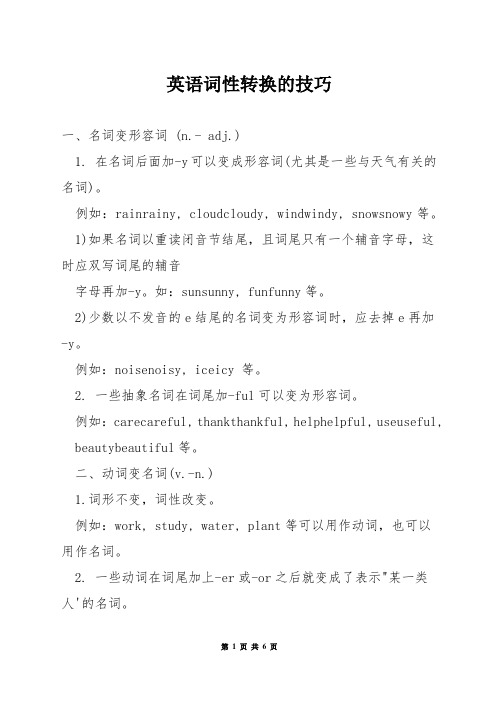
英语词性转换的技巧一、名词变形容词 (n.- adj.)1. 在名词后面加-y可以变成形容词(尤其是一些与天气有关的名词)。
例如:rainrainy, cloudcloudy, windwindy, snowsnowy等。
1)如果名词以重读闭音节结尾,且词尾只有一个辅音字母,这时应双写词尾的辅音字母再加-y。
如:sunsunny, funfunny等。
2)少数以不发音的e结尾的名词变为形容词时,应去掉e再加-y。
例如:noisenoisy, iceicy 等。
2. 一些抽象名词在词尾加-ful可以变为形容词。
例如:carecareful, thankthankful, helphelpful, useuseful, beautybeautiful等。
二、动词变名词(v.-n.)1.词形不变,词性改变。
例如:work, study, water, plant等可以用作动词,也可以用作名词。
2. 一些动词在词尾加上-er或-or之后就变成了表示"某一类人'的名词。
例如:workworker, teachteacher, singsinger, jumpjumper, playplayer,learnlearner, visitvisitor, inventinventor等。
2学好英语的小窍门学习英语是随时随地的比如说买了一件新东西我都会对上面的包装或说明书仔细研究一番,当然不是在研究商品本身,是为了看上面的英语解释,想多几个地道的英语表达而已。
买了一瓶止咳露,从上面也学到不少东西。
比如说,有效期可以说成validity,规格可以说成specification,贮藏可以说成 storage,放在儿童接触的地方可以这样说keep out of the reach of children,等等等等。
这些东西都非常有用,虽然有时你看了一遍不一定记得,但当你下次再碰到它们的时候你的印象就会更加深入,久而久之便会记得。
- 1、下载文档前请自行甄别文档内容的完整性,平台不提供额外的编辑、内容补充、找答案等附加服务。
- 2、"仅部分预览"的文档,不可在线预览部分如存在完整性等问题,可反馈申请退款(可完整预览的文档不适用该条件!)。
- 3、如文档侵犯您的权益,请联系客服反馈,我们会尽快为您处理(人工客服工作时间:9:00-18:30)。
词形转换无非是动词与名词,形容词与副词,名词与形容词之间的相互转化记住词形转换的一些规则、构词法及实例。
1、修饰名词可用形容词。
a------woman(beauty美丽的)2、修饰不定代词形容词要后置。
Something-----(strangely奇怪的)3、修饰动词、形容词、要用副词。
The car runs ------(fast快速的)4、介词后面用名词、动名词。
He didn’t go to school because of------(ill病)He spent three dollars -----this pair of shoes.(buy买)5、及物动词后面用名词、代词作宾语。
The doctor gave ----- some -----for my cold.(I \medical我、药)6、人称代词的主格与宾格、形容词性物主代词和名词性物质代词、及反身代词,应根据其在句中的作用而转换。
He tried to do ---homework by-------(him他)7、名词要注意单复数。
He stood there ,shaking -----with his old friend.(hand手)8、动词要注意时态、语态、非谓语动词形式。
He decided-----a new bike.(buy买)9、形容词、副词要注意比较级、最高级的变化。
It’s good to help -----people when there are carrying heavy things.(old年纪老的)10、数词要注意基数词、序数词的变化。
There are ----new words in the -----lesson.(four\five四、五)11、系动词可接形容词。
The eggs can go ------(bad坏)in summe.12、要注意固定结构及习惯用语。
He can’t help---- when he heard the good news.(laugh大笑)一、名词变为形容词的方法1.在名词后面加-y 可以变成形容词(尤其是一些与天气有关的名词)。
例如:rain—rainy, cloud—cloudy, wind—windy, snow—snowy, health—healthy, luck—lucky 等。
注意:1) 如果名词以重读闭音节结尾,且词尾只有一个辅音字母,这时应双写词尾的辅音字母再加-y。
如:sun—sunny, fun—funny 等。
2)少数以不发音的e结尾的名词变为形容词时,应去掉 e 再加-y。
例如:noise—noisy, ice—icy 等。
2. 一些抽象名词在词尾加-ful 可以变为形容词。
例如:care—careful, thank—thankful, help—helpful, use—useful, beauty—beautiful 等。
3. 一些表示国家的名词可以在词尾加-ese, -ish 或-n 构成表示国籍、语言的形容词。
例如:China—Chinese, Japan—Japanese, England—English, America—American, India—Indian, Australia —Australian (注意Canada—Canadian)。
4. 在名词后加-ous 变为形容词。
例如:danger—dangerous 等。
5. 在名词后加-ly 变为形容词。
例如:friend—friendly, love—lovely 等。
6. 在名词后加-less 构成含有否定意义的形容词。
例如:care—careless(粗心的),use—useless(无用的),hope—hopeless(没希望的),home—homeless(无家可归的)等。
7. 一些以-ence 结尾的名词,把ence 改为ent 变成形容词。
例如:difference—different,silence—silent 等。
二、动词变为名词的方法1. 词形不变,词性改变。
例如:work, study, water, plant 等可以用作动词,也可以用作名词。
2. 一些动词在词尾加上-er 或-or 之后就变成了表示“某一类人”的名词。
例如:work—worker, teach—teacher, sing—singer, jump—jumper, play—player, learn—learner, visit—visitor, invent—inventor 等。
注意:1) 以不发音的e 结尾的动词,在词尾加-r。
例如:drive—driver, write—writer 等。
2) 以重读闭音节结尾,且末尾只有一个辅音字母的动词,应双写末尾的辅音字母,再加-er。
例如:run—runner, win—winner,begin—beginner 等。
3.在动词词尾加-ing 变成名词(方法与动词变为现在分词的方法相同)。
例如:meet—meeting, build—building, wait—waiting, wash—washing, swim—swimming, shop—shopping, begin—beginning 等。
三、形容词变为副词的方法 一般在形容词的词尾加-ly可以变成副词。
例如:quick—quickly, slow—slowly, loud—loudly, sudden—suddenly 等。
注意: 1. 一些以“辅音字母+ y”结尾的形容词,要把y 改为i 再加-ly。
例如:happy—happily, angry—angrily, lucky—luckily, heavy—heavily, noisy—noisily 等。
2.有些以-ble 或-le 结尾的形容词,去掉 e 加-y。
例如:possible—possibly, terrible—terribly 等。
3.少数以e 结尾的形容词,要去掉e 再加-ly。
例如:true—truly 等。
但绝大多数以e 结尾的形容词仍然直接加-ly。
例如:polite—politely, wide—widely 等。
4.以-l 结尾的形容词变为副词时仍然要在词尾加-ly,而不是只加-y。
除非是以-ll 结尾的才在词尾只加-y。
例如:usual—usually, careful—carefully, useful—usefully, full—fully 等。
例题解析1. Make_________ at home, Jerry and Terry. (you)2. Turn to the ____________ page and you will find some useful in-formation about local customs. (nine)3. The war between the Greeks and the ______________lasted ten years. (Troy)4. Before the man is thrown into prison,more____________ are needed. (prove)5. In space,there are still many new stars we are ____________of. (aware)6. The thief ran out of the house and soon ______________in the darkness. (appear)7. The____________ temple was badly destroyed in a big fire. (wood)8. The rooms in that five-star hotel are always _________________clean. (spot)自测练习1. The Chinese people are very_________(friend) to foreigners.2. I want to know how to eat and drink __________. (health)3. Crying for things you can't have is __________. (child)4. The ________(watch) are Lily and Lucy’s.5. I think it'll be_________(sun) tomorrow afternoon.6. He has gone to the ________(teachers) office.7. The doctor tried his best to save many people’s _________(life).8. We can see many_________(sheep) in the Australian farm.9. The doctor will ___________(operation) on her leg tomorrow.10. Tim did badly in the exam. John did even ______(badly).11. What kind of meat is ________(popular) in China, pork, beef or chicken?12. Are your parents _________(interesting) in swimming?13. English is __________(wide) used all over the world.14. I am ill. I feel very ___________(comfortable).15. I have a friend from Korea._________(he) name is Jim.16. They did all the work by________(they).17. The professor will give __________(they) a talk the day after tomorrow.18. We really enjoyed _________(we) during our stay in Beijing.19. A friend of __________(I) will come to our school next Friday.20. I'm sorry to keep you_________(wait).21. Edison was one of the greatest __________ in the world. (invent)22. Can't you hear them_________(sing) in the classroom?23. The bottle is ___________(break).24. Have they finished the_________(operate)?25. Can you tell him_________(call) me this afternoon?26. Her aunt is a famous _________(dance) in our country.27. The Yellow River is the_________(two) longest river in China.28. Two _________(three) of the students in our class are good at English.29. The Olympic Games are held every _________(fourth)years.30. There are about five __________(hundred) boy students in our school.31. May is _________(one) student to work out the difficult problem.32. They saw_________(thousand) of birds in the forest.答案例题解析1.主要考make yourself at home这个词组,学生基本上能将you变成yourself,但往往忽视本句的说话对象是Jerry and Terry两个人,而没有将yourself改成yourselves,而且错的人较多,反映出学生粗心的坏习惯。
